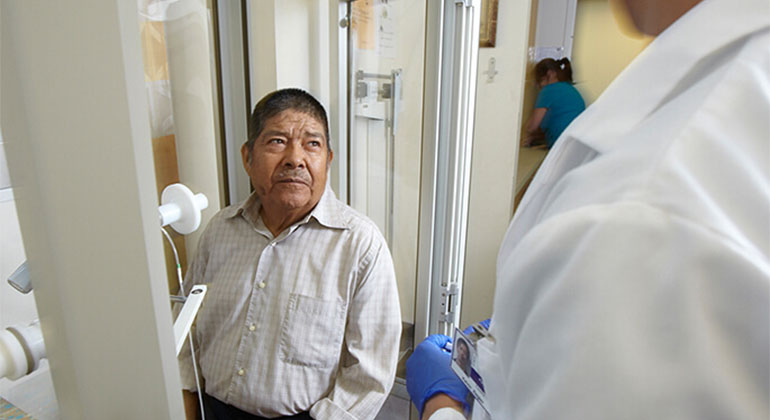
Asthma Program
Our teams of specialists provide you, our patients, with exceptional, personalized care so you can live your healthiest life.
The Mount Sinai Respiratory Institute delivers innovative, multidisciplinary care for patients with the full spectrum of lung and respiratory diseases. The Institute unites leading specialists in pulmonology, critical care, sleep medicine, allergy/immunology, cardiology, ENT, gastroenterology, rheumatology, and thoracic surgery, to provide fully integrated, patient-centered care under one roof. Anchored by Mount Sinai’s strong research enterprise and commitment to precision medicine, The Institute drives advances in diagnostics, personalized therapies, and clinical trials to improve outcomes for every patient. The Respiratory Institute creates new options for patients in New York City and the surrounding region.
Our asthma program doctors have expertise in all aspects of asthma care. We evaluate and treat the most complicated asthma cases and use the latest research and most advanced treatments. Our doctors also address health issues that can make asthma worse. We refer to specialists as needed. In addition, we provide you with the education and support you need to stay healthy and manage your asthma.
Services We Offer
Our comprehensive program includes the following services:
- Advanced diagnostic testing
- Asthma education and inhaler training
- Consultation with pulmonary specialist
- Consultation with an allergy specialist
- Coordination of treatment with all current advanced therapies for asthma including biological therapies and bronchial thermoplasty
- Personalized self-management strategy
- Environmental assessment
- Referral to a gastroenterologist, otolaryngologist, occupational and environmental specialist, referral to mental health care resources, physical therapist and pulmonary rehabilitation, and social worker as needed
In addition, the Asthma Program collaborates with the Mount Sinai World Trade Center Worker and Volunteer Medical Screening Program to treat asthma in individuals who worked or volunteered at Ground Zero and other sites on 9/11.
We offer care for special forms of the condition, including:
- Allergic asthma
- Allergic bronchopulmonary aspergillosis
- Aspirin-sensitive asthma
- Asthma in pregnancy
- Asthma with fungal sensitization
- Asthma worsened by sinonasal disease
- Exercise-induced asthma
- Severe eosinophilic asthma
- Steroid dependent asthma
Causes of Asthma
The causes of asthma can be due to environmental and/or genetic factors. Environmental factors that can trigger asthma symptoms include:
- Animal dander
- Dust mites
- Mold
- Pests (cockroaches, rodents)
- Strong odors and fumes
- Sudden changes in temperature or climate
- Tree, grass, and weed pollen
In order for a person to experience symptoms of asthma, several processes must take place. First, there is inflammation in the inner linings of the airways. These airways experience swelling, resulting in less room for air to pass through. Second, the airway muscles tighten, thus causing the airways to close further. Airways produce mucus due to inflammation, which clogs the airways. Finally, the combination of inflammation, reactive airways, and mucus proliferation can be associated with structural changes in airways that can cause persistent limitation of airflow and reduced lung function
People can also experience an asthma from something they swallow rather than breathe. These triggers can include medications and foods:
- Anti-inflammatory medications (aspirin, ibuprofen, naproxen and others)
- Food allergies
- Food preservatives like sulfites
- Heart medications such as beta blockers (atenolol, Lopressor, carvedilol and others)
While most people develop asthma as children, adults can also develop asthma. People who work with the following products may be at increased risk of developing asthma:
- Animals
- Antibiotics
- Construction material
- Detergents
- Domestic and non-domestic cleaners
- Fabrics
- Grains (such as wheat, barley, and corn)
- Insulation
- Packaging materials
- Textile workers
- Other work places with exposures to dusts or fumes
Asthma can also be triggered by non-allergic irritants, such as:
- Exercise
- Exposure to high heat and humidity
- Laughing hard, crying, shouting, strong emotions
- Smog and smoke
- Strong smells (such as paint fumes, perfumes, cleaning products)
- Sudden exposure to cold air
- Viral infections such as a cold or the flu
Symptoms of Asthma
Asthma symptoms should be taken very seriously and treated immediately. Symptoms that awaken you at night or result in you needing rescue medication such as albuterol multiple times daily should prompt you to seek medical attention urgently.An asthma flare-up or attack can happen at any time. Mild symptoms may only occur for short periods of time, while more severe asthma symptoms can last hours or days.
- Chest tightness
- Excessive coughing
- Shortness of breath
- Wheezing
Treatments for Asthma
Although there is no cure for asthma, your doctors at Mount Sinai can keep it under control. Since each asthma case is different, you and your specialist need to create a personalized asthma treatment plan. Your treatment plan may include some or all of the following:
- Anti-inflammatory drugs (including steroids)
- Bronchial thermoplasty
- Bronchodilators
- Immunotherapy
- Inhalers
- Nebulizers
- Prednisone
- Modifying your environment to reduce exposure to specific allergic and non-allergic triggers
The Mount Sinai Respiratory Institute is conducting a number of research studies and clinical trials to improve the diagnosis and treatment.
Why Mount Sinai Respiratory Institute
Our Asthma Program doctors have expertise in all aspects of asthma diagnosis and treatment. If standard inhaled therapy does not work for you, we have other options, including injectable biological therapies (such as anti-IL5, anti-IGE, anti-IL4 receptor, and alpha) at our infusion center. We can also assess any other conditions you may have that can cause coughing, wheezing, and breathlessness. We perform bronchoscopy to evaluate complicated asthma and offer bronchial thermoplasty if your asthma is not controlled by other measures. Our clinical trials provide the latest asthma therapies, if appropriate.
In addition, we emphasize patient education and support. Our nurses teach you how to use your inhaler for best results. We help you learn how to minimize allergic and non-allergic triggers. We can also help with the social issues that can complicate asthma. Our social worker is here to help and we also have an asthma support group that meets every six weeks.
